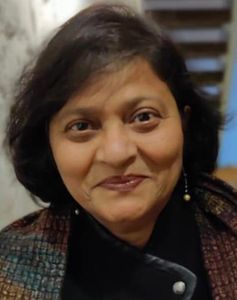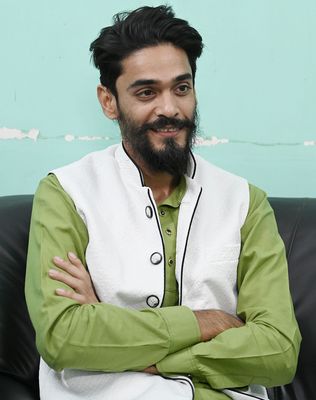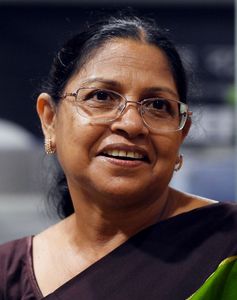Seema Ray stood in her ramshackle hut, holding a letter as if it were a death sentence. The letter informed her that the Unique Identification Authority of India had deactivated the Aadhaar allotted to her husband, Parimal Ray.
Seema was in shock. Two decades ago, the Ray family had migrated from Bangladesh to West Bengal. They had been living in Cooper’s Camp, a town in Ranaghat subdivision of West Bengal’s Nadia district, which borders Bangladesh. The Rays are part of the Namasudra community, also called Matuas, who number around 70 lakh in West Bengal.
For migrant families residing in districts along the state’s 2,217km-long border with Bangladesh, Aadhaar is more than a survival kit. Having an Aadhaar protects them from uncomfortable questions regarding their migration. Acquiring Aadhaar is also the first step in letting migrant families grow roots on Indian soil.
Parimal’s Aadhaar was his family’s lifeline. It helped Seema work as domestic help, and Parimal as a labourer. Their son Anik, who has liver disease, requires medicines worth Rs2,000 a month. The Ray family fears that they could well cease to exist if Parimal’s Aadhaar is permanently deactivated.
Border districts are filled with such stories, but they are yet to become part of national consciousness. “In Cooper’s Camp, 95 per cent of the population is udbastu (refugees),” said Dilip Das, town president of the Trinamool Congress. “We live in a notified area. We have around 18,000 voters.”
The Union government said it was “by mistake” that a few thousand Aadhaar cards in the region were deactivated. After the issue came to light, local BJP workers frantically sent messages to Delhi to make the UIDAI re-activate the Aadhaar cards. Das and other Trinamool leaders have also been working to connect with people who have been affected.
Parimal has been told by his bank that his Aadhaar will be reactivated in two months. But, in the meantime, he and his family will have to live in constant fear.
It was to address this fear and insecurity of the Matuas that the BJP had come up with the controversial Citizenship (Amendment) Act in 2019. The objective was to help only the Hindus among the migrants, and win their votes. For the BJP, the CAA is a tool to instantly connect with lakhs of Bengali Hindus who came from Bangladesh.
Matua migrants who have acquired Aadhaar and other identification documents appreciate the BJP’s gesture. They say the CAA, when implemented, will add a layer to their identity as Indian citizens.

But far away from their world are the elite bhadralok and liberals of Kolkata, who strongly oppose the CAA. “It has only one purpose―create communal polarisation in a society that has 27 to 30 per cent Muslim population,” said Prasenjit Bose, a left-leaning economist and activist.
According to Bose, “Ninety-nine per cent of infiltrators from Bangladesh are Hindus. The CAA ‘chronology’, which Union Home Minister Amit Shah talks about, is that counting for the National Register of Citizens will happen only after giving Indian citizenship to Matuas. Dilip Ghosh, former state BJP president, has declared that once the NRC is done, they will deport one crore Muslims. But the BJP, of late, has realised that most of the Muslims in West Bengal were born here.”
According to Amit Malviya, BJP IT cell chief and co-in-charge of the party unit in West Bengal, the state needed an “alignment of religious Hindus”. “The average Bengali is both deeply religious and ritualistic. But in Bengal, ironically, the Congress, the left and the Trinamool Congress are all left-leaning. Religious Bengalis have found a home with the BJP. Bengalis may not be outwardly expressive of their faith, but they are not agnostic either. We have found each other,” he told THE WEEK.
But the response, in reality, has been mixed. Some say the CAA’s symbolic value matters, but others are plainly dismissive. Mamata Bala Thakur, a Matua leader belonging to the family of Harichand Thakur, the 19th-century founder of the Matua sect, said the BJP had lost credibility among the community because the party failed to fulfil its 2019 promise. “They have not started the [CAA] process,” said Thakur, a Trinamool leader and Rajya Sabha member. “I want to ask the BJP: ‘Didn’t you win seats in 2019 with the help of Matuas? In 2019, Matuas could vote for you because they are Indian citizens. Then why is the CAA necessary if we are Indian citizens already?”
Trinamool leaders say the CAA would prompt “reverse polarisation” among Bengali-speaking Muslims in border areas, which will end up benefiting their party. “The CAA is all set to fail. The BJP got the Ram Temple it wanted. Now, it should stop spreading hatred,” said Vivek Gupta, Trinamool MLA from Jorasanko.
According to him, the BJP in West Bengal is in a catch-22 situation. “If it makes the CAA an election plank, it will unite Bengali-speaking Muslim migrants in support of the Trinamool. The Hindu migrants know that nobody is going to get citizenship because they do not have the documents needed to apply.”
Traveling through border villages, one gets the feeling that no state in India is as desperate to vote as Bengal is. Unfortunately, for the Trinamool, a series of events in Sandeshkhali in North 24 Parganas district has now overtaken the CAA issue. A popular agitation against Sheikh Shahjahan, a local mastan (bully) and Trinamool strongman, is becoming a turning point in the political battle. Shahjahan was once a close associate of Jyotipriya Mallick, a former food minister who was arrested by the Enforcement Directorate last year in a case related to an alleged ration distribution scam. When ED officers reached Shahjahan’s house to question him in January, his supporters attacked them. After Shahjahan went into hiding, many local women, both Hindus and Muslims, levelled allegations of rampant land grab and sexual harassment against him. They also began speaking out in support of a woman who testified in court accusing Shahjahan of raping her.
Shahjahan was arrested on February 29, and is now in police custody. The allegations against him have become a talking point across the state. The controversy could be more impactful than the CAA, because it concerns law and order, communal harmony and security of the poor in villages. During a visit to Arambagh, Prime Minister Narendra Modi himself told women: “Har chot ka jawab vote se dena (Remember your wounds while voting).”

In the battle for Bengal, Modi and the BJP have raised the ideological and political stakes to the highest level. The BJP first got a taste of success in 2019, when it won 18 of 42 seats with a 40.64 per cent vote share. In Alipurduars constituency in north Bengal, the BJP got as much as 54.4 per cent of votes. Buoyed by the results, the BJP campaigned harder in the 2021 assembly polls, but the party could win only 77 of 294 seats. Now, once more, the BJP is pulling out all stops in Bengal.
The state has always been special for the RSS, as it was Syama Prasad Mookerjee―founder of the Bengali Hindu Homeland Movement―who co-founded the BJP’s predecessor Jan Sangh. “For many of us, West Bengal is a Hindu homeland,” Anirban Ganguli, BJP candidate in Jadavpur and director of the Syama Prasad Mookerjee Research Foundation in Delhi, told THE WEEK. “The Bengal assembly, on June 20, 1947, had voted in favour of the division of Bengal. Then the Congress, the Hindu Mahasabha and left parties voted for the division to have a Hindu homeland for Bengali-speaking Hindus. Don’t forget [CPI(M) leader] Jyoti Basu, who as a member of the assembly, had voted for it.”
Upper-caste Hindu Bengalis oppose the BJP, though. “If the BJP succeeds in Bengal, they would first target the bhadralok,” said prominent journalist Sudipta Sengupta.

The bhadralok―a class of ‘gentlefolk’ comprising traditional upper castes such as Brahmins, Baidyas and Kayasthas―have long been admired for their refined taste in arts and culture. But they seem to be losing their political relevance now―not just because Bengal is in transition, but also because there are many Bengals now.
The Bengal of the Rajbanshi community in the north, for instance, has a fascinating history of its own. In 2019, the BJP won seven of eight seats in north Bengal riding on the “identity politics” of the Rajbanshis, who trace their roots to the erstwhile Kamata and Koch kingdoms in the Cooch Behar region.
Then there is the Bengal of Panchayats, which has long been a violent epicentre of power politics. A reason that Bengal has turned fertile ground for the BJP is that Chief Minister Mamata Banerjee has not been able to change the nature of panchayat politics since she ended the long rule of the left government. Interestingly, in some places, the Sheikh Shahjahan effect is so strong that people are comparing the three-decades-long Left rule with the Trinamool’s 13 years in power.
“The Trinamool controls panchayats to control funds,” said journalist-author Rajat Roy. “Around 40 per cent of panchayats are uncontested. Local leaders in Bengal enjoy immense power. Bengal has traditions of bhakti and shakti movements. The violence is ingrained in us as much as bhakti.”
According to Roy, the fact that the land issue in Bengal is not yet solved is “creating pressures and fights”. Large-scale land grab by mastans at the panchayat level remains a big problem. “There are many Shahjahans in villages,” said Dipayan, a boy in Basirhat who was helping the BJP collect booth-level data. Apparently, the mastans turn the land they grab into illegal bheri (shallow fish ponds).
At Shyamnagar, a village in Ranaghat constituency, THE WEEK came across a crowd of around two dozen people who were protesting a land-grab attempt by a local mastan―Pinto Dutta, a Trinamool strongman. “Pinto wants to grab this land. Residents are opposing the move,” said Amar Dakua, a local boy.
An acquaintance of Pinto, who was also a Trinamool leader, said that trouble started when Pinto asked villagers to download an app and put money into it. “He promised to get them jobs in the Army,” he said. “Many villagers lost big money. After strong protests, the police acted and sent Pinto to jail.”
Later, Amar told me that Pinto had dropped his plan to grab the land and sell it. “It is the Shahjahan effect!” he explained.
The BJP has been trying to take advantage of the grassroots anger. “In our village, we worked for the BJP in the last election,” said Kunal Brahm of Basirhat, who used to work for the left. “All anti-BJP forces got angry. Our water supply was cut off. State BJP president Sukanta Majumdar came to our village and installed a new hand pump for us.”
Proshanto Das, a dalit migrant from Bangladesh, is angry at Trinamool leaders for closing his business in Basirhat. “Nandigram se Mamata didi aye the, Sandeshkhali se jayegi (Mamata rose because of Nandigram; she would fall because of Sandeshkhali),” said Das.
Few voters, however, criticise Mamata directly. “Tolabaazi (extortion), cut money (illegal commission) and mastan are adjectives associated with Trinamool leaders in villages,” said a boy in Basirhat, “but Mamata is always addressed respectfully as ‘didi’.”
At Hasnabad, a town near Basirhat, I met Trinamool’s local party president Eskender Gazi, who has a flourishing fishing business and an office surrounded by wetlands. “Jab tak Trinamool ke saath Muslim vote rahega, tab tak Trinamool rahega (Trinamool will survive as long as the Muslim vote remains with it),” he said.
The Sandeshkhali issue has given the BJP a talking point, but the saffron party cannot do anything about the massive vote bank of Bengali Muslims that gives Mamata the edge. “The BJP has ambitious Bengal plans, but they won’t work,” said Gazi. “The CAA is terror. There is no question of accepting it. Mamata didi will get votes of Bengali Muslims, and there won’t be any division [of votes].”
But there could well be a dent in the Trinamool’s Muslim vote base. The Indian Secular Front, led by Bhangar MLA Nawsad Siddiqui, has tied up with left parties and the Congress. The ISF was founded in 2021; the same year, Siddiqui defeated a Trinamool candidate to become its first MLA. His brother Abbas Siddiqui leads an influential mazar (shrine) at Furfura Sharif in Hooghly district.
Nawsad has been touring border districts where Muslims are dominant. Whether his party would be able to win voters remains uncertain, but Siddiqui has already been branded by the Trinamool as the ‘Owaisi of Bengal’―after Asaduddin Owaisi of the All India Majlis-e-Ittehadul Muslimeen, who has long been accused of splitting Muslim votes to help the BJP.
“I am against the violence and corruption of Trinamool bullies,” said Siddiqui. “I am totally against the CAA, which is merely a BJP game to corner votes. Everyone knows that there is a ‘setting’ (deal) between the Trinamool and the BJP…. Mamata has been getting Muslim votes since 2011, but she won’t give them development and education. She is not capable of freeing panchayats from corruption and violence.”
The reality, though, is that Bengali Muslims do not really have an alternative to Mamata right now. Mamata’s connect with district party leaders and cadres remains outstanding, and she continues to enjoy the image of being pro-poor. She has also been using Bengali sub-nationalism with ease to attract 7.5 crore voters. “Mamata’s popularity rating in the state has always been 80 per cent,” said Pratik Jain, head of I-PAC, which handles the Trinamool’s social media accounts.
For its part, the BJP is hoping that Modi and his narrative of nationalism stand to gain in the Lok Sabha polls. “Our survey shows that in each Bengal constituency, Modi has an exclusive pull of 6 per cent to 8 per cent votes,” said Samik Bhattacharya, BJP leader and Rajya Sabha member.
Sunil Bansal, national general secretary of the BJP, said there were 70 lakh direct beneficiaries of the Modi government’s welfare schemes in Bengal. “Our major vote base is the poor,” he said. “Bengal elections are violence-prone. There are over 78,000 booths, and around 20,000 booths are exclusive ‘minority voters’ booths. The Trinamool gave political power to Muslims to woo them; since then, poor Hindu Bengalis have gravitated towards the BJP. Their Hindu sentiments were suppressed within…. We have brought out their hidden Hindu identity.”
That Abhishek Banerjee, her brother’s son, has risen rapidly in the Trinamool has exposed Mamata to charges of nepotism. The corruption cases against Abhishek are also a liability for her. Also, part of the Trinamool is Mamata’s sister’s daughter, Aditi Gayen, who is said to be nursing her own ambitions.
The Trinamool is heavily relying on Mamata’s tenacity in overcoming challenges. The party also expects women voters and beneficiaries of the government’s 20-odd welfare schemes―from egg curry for Rs5 to Rs1,000 as monthly allowance to women―to power the party to victory.
But in Bengal, it is always difficult to predict the outcome of elections. Because, here, people do not just go and vote. Here, vote korante howe! You have to manage to get them to vote.





